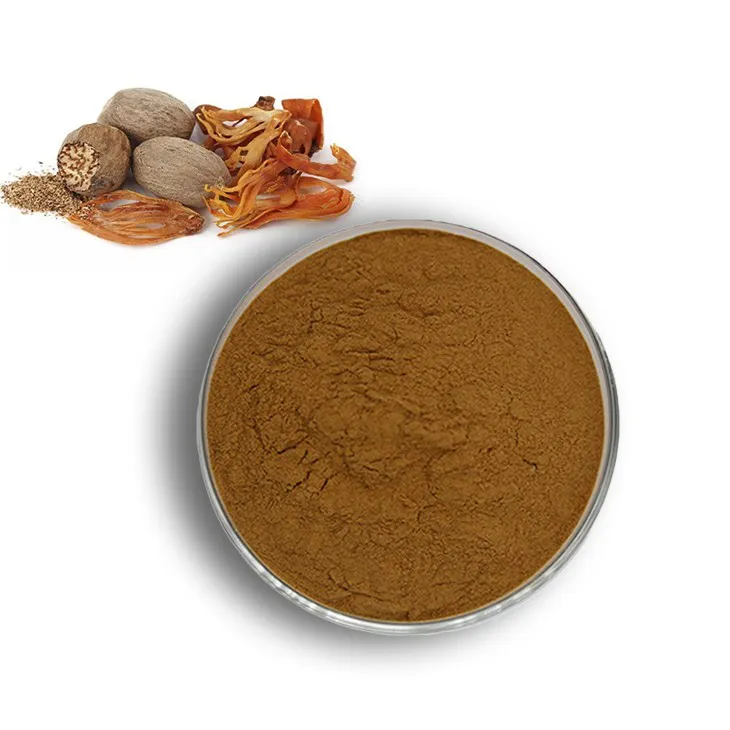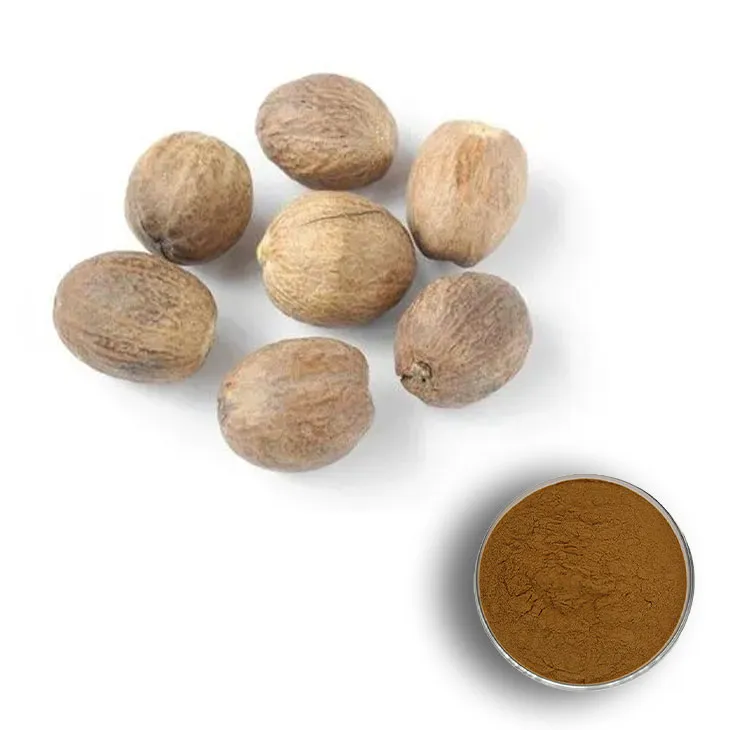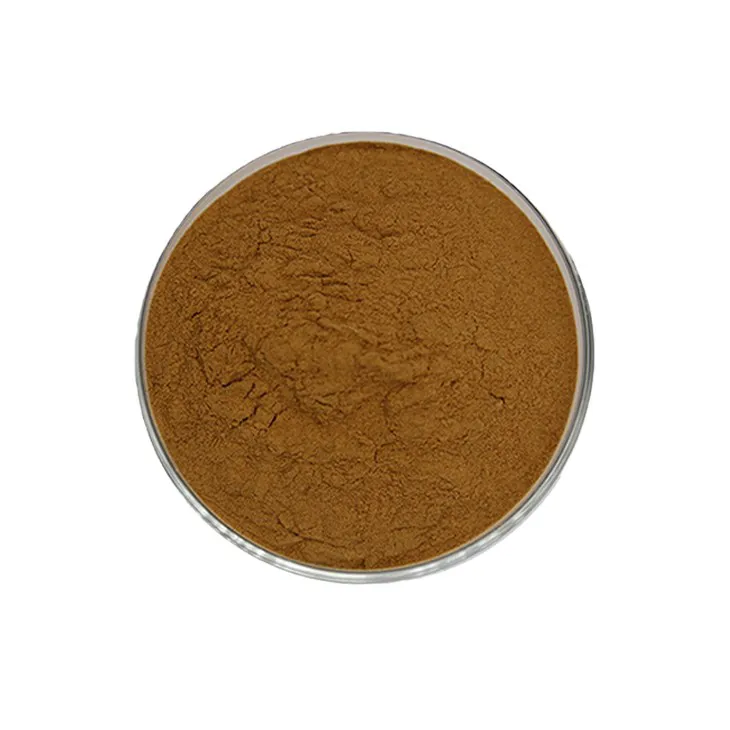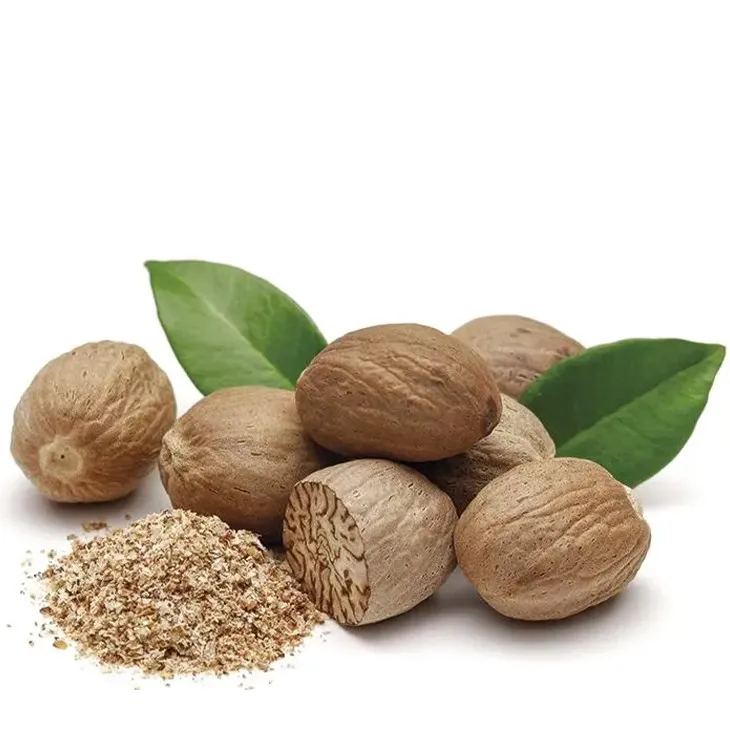- 0086-571-85302990
- sales@greenskybio.com
Nutmeg Extract Production: A Complete Guide for Consumers and Manufacturers
2024-12-18

1. Introduction to Nutmeg Extract
Nutmeg Extract is a highly valuable product derived from the nutmeg seed. Nutmeg (Myristica fragrans) is a tropical evergreen tree native to the Spice Islands of Indonesia. The extract contains a rich blend of compounds that give it a distinct aroma and flavor, making it a popular ingredient in various industries, including food, beverage, cosmetics, and pharmaceuticals.

2. Production Steps of Nutmeg Extract
2.1 Harvesting of Nutmeg
- Harvesting time: Nutmeg fruits are typically harvested when they are fully ripe. This usually occurs when the outer husk of the fruit splits open, revealing the nutmeg seed covered by a red aril (mace). In Indonesia, the main producer of nutmeg, the harvesting season can vary depending on the region but generally occurs between June and August. - Harvesting method: The fruits are carefully hand - picked to avoid damaging the seeds. Workers use long poles or climb ladders to reach the fruits in the upper branches of the trees.
2.2 Separation of Nutmeg from the Fruit
- After harvesting, the nutmeg seeds need to be separated from the fruit. The outer husk is removed, and the nutmeg seed along with the mace (the aril) is obtained. The mace is carefully detached from the nutmeg seed as it is also a valuable spice. - This separation process is usually done by hand or with the help of simple tools to ensure the integrity of the nutmeg seed.
2.3 Drying of Nutmeg
- Drying process: The freshly harvested nutmeg seeds are then dried. Drying can be done either in the sun or in drying chambers. Sun - drying is a traditional method where the nutmeg seeds are spread out on clean mats or trays in a well - ventilated area. In drying chambers, controlled temperature and humidity are maintained to ensure proper drying. - Duration: The drying process usually takes about two to three weeks until the moisture content of the nutmeg seed is reduced to around 10 - 12%. Proper drying is crucial as it helps in preventing spoilage and mold growth during storage.
2.4 Grinding of Nutmeg
- Once the nutmeg seeds are dried, they are ground into a fine powder. This can be done using industrial grinders or mills. The grinding process should be carefully controlled to achieve a consistent particle size. - A fine powder is preferred for extraction as it provides a larger surface area for the extraction solvents to act upon.
2.5 Extraction of Nutmeg Extract
- Solvent extraction: The most common method for nutmeg extract production is solvent extraction. Organic solvents such as ethanol or hexane are often used. The ground nutmeg powder is mixed with the solvent in a ratio determined by the extraction process requirements. - Supercritical fluid extraction: Another method is supercritical fluid extraction, which uses supercritical carbon dioxide. This method is considered more environmentally friendly as it does not leave behind solvent residues. The supercritical carbon dioxide penetrates the nutmeg powder and extracts the desired compounds. - Filtration and concentration: After the extraction, the mixture is filtered to remove the solid particles. The filtrate, which contains the nutmeg extract dissolved in the solvent, is then concentrated. This can be done through evaporation or other concentration techniques to obtain a more concentrated extract.

3. Safety Considerations in Nutmeg Extract Production
3.1 Handling of Solvents
- When using solvents like ethanol or hexane in the extraction process, proper safety measures must be taken. These solvents are flammable and can pose a fire hazard. Workers should be trained in handling solvents safely, including proper storage, handling, and disposal procedures. - Adequate ventilation is essential in the extraction area to prevent the buildup of solvent vapors, which can be harmful if inhaled.
3.2 Quality Control of Raw Materials
- The quality of the nutmeg used for extraction is crucial. Only high - quality, fully ripe nutmeg should be used. Raw materials should be inspected for signs of mold, insect infestation, or other contaminants. - Supplier audits can be carried out to ensure that the nutmeg is sourced from reliable and sustainable sources.
3.3 Hygiene in the Production Facility
- The production facility should maintain high standards of hygiene. All equipment used in the production process, such as grinders, extractors, and filters, should be regularly cleaned and sanitized. - Workers should follow strict hygiene protocols, including wearing appropriate protective clothing and washing hands regularly.

4. Benefits of Nutmeg Extract in Different Industries
4.1 Food Industry
- Flavor enhancer: Nutmeg extract is widely used in the food industry as a flavor enhancer. It imparts a warm, spicy, and slightly sweet flavor to a variety of dishes, such as baked goods, puddings, and savory sauces. - Preservative: It also has some preservative properties, which can help in extending the shelf life of certain food products.
4.2 Beverage Industry
- Aroma addition: In the beverage industry, nutmeg extract is added for its aromatic properties. It can be used in hot beverages like coffee, tea, and mulled wine, as well as in some cold beverages such as certain cocktails and soft drinks. - Flavor balance: It helps in balancing the flavors in beverages, adding a complex and unique note.
4.3 Cosmetics Industry
- Skin benefits: Nutmeg extract has antibacterial and anti - inflammatory properties, which make it beneficial for skin care products. It can be used in creams, lotions, and soaps to treat acne, soothe irritated skin, and improve overall skin health. - Aromatherapy: The pleasant aroma of nutmeg extract is also used in aromatherapy products, such as essential oils and scented candles, to promote relaxation and reduce stress.
4.4 Pharmaceuticals Industry
- Medicinal properties: Nutmeg extract contains compounds that have potential medicinal properties. For example, it has been studied for its anti - diarrheal, anti - spasmodic, and antioxidant effects. It may also have potential in the treatment of certain neurological disorders, although more research is needed. - Drug formulation: It can be used in drug formulation as an excipient or to add certain beneficial properties to the final product.

5. Conclusion
Nutmeg extract production is a complex process that involves multiple steps from harvesting to extraction. Safety considerations are of utmost importance to ensure the quality and safety of the final product. The extract offers a wide range of benefits in various industries, making it a valuable ingredient. Whether you are a consumer interested in the products containing nutmeg extract or a manufacturer involved in its production, understanding these aspects can help in making informed decisions.
FAQ:
What are the main steps in nutmeg extract production?
The production of nutmeg extract typically involves several steps. First, high - quality nutmeg seeds are selected. Then, these seeds are usually dried to a proper moisture level. After that, extraction methods such as solvent extraction or steam distillation can be used. Solvent extraction may involve using organic solvents like ethanol to draw out the active compounds from the nutmeg. In steam distillation, steam is passed through the nutmeg to vaporize the volatile compounds, which are then condensed to obtain the extract.
What safety considerations are there in nutmeg extract production?
In nutmeg extract production, safety is crucial. When using solvents for extraction, proper handling and ventilation are required to prevent exposure to harmful vapors. Workers should wear appropriate protective gear. Also, during drying processes, temperature control is important to avoid overheating which could cause degradation of the nutmeg or even pose a fire risk. In addition, strict quality control measures are needed to ensure that the final extract is free from contaminants such as pesticides or heavy metals.
How does nutmeg extract benefit the food industry?
Nutmeg extract is widely used in the food industry. It can add a warm, spicy flavor to a variety of products such as baked goods, confectionery, and beverages. It also has preservative properties which can help extend the shelf - life of some food products. Moreover, it can enhance the overall aroma profile of food, making it more appealing to consumers.
What role does nutmeg extract play in the pharmaceutical industry?
In the pharmaceutical industry, nutmeg extract has several potential benefits. It may have antimicrobial properties, which can be useful in the development of drugs to combat certain infections. Some components of nutmeg extract may also have anti - inflammatory effects, making it a possible ingredient in medications for inflammatory conditions. Additionally, it has been studied for its potential role in digestive health, such as alleviating indigestion.
How can consumers ensure the quality of nutmeg extract products?
Consumers can ensure the quality of nutmeg extract products in several ways. Firstly, they should look for products from reputable manufacturers. Checking for proper labeling, including information about the source of the nutmeg, extraction method, and any additives, is important. Certifications such as organic or non - GMO labels can also indicate higher quality. Additionally, consumers can read reviews and seek recommendations from reliable sources.
Related literature
- Nutmeg Extract: Production, Properties and Applications"
- "Safety and Quality in Nutmeg Extract Manufacturing"
- "The Role of Nutmeg Extract in the Food and Pharmaceutical Industries"
- ▶ Hesperidin
- ▶ citrus bioflavonoids
- ▶ plant extract
- ▶ lycopene
- ▶ Diosmin
- ▶ Grape seed extract
- ▶ Sea buckthorn Juice Powder
- ▶ Beetroot powder
- ▶ Hops Extract
- ▶ Artichoke Extract
- ▶ Reishi mushroom extract
- ▶ Astaxanthin
- ▶ Green Tea Extract
- ▶ Curcumin Extract
- ▶ Horse Chestnut Extract
- ▶ Other Problems
- ▶ Boswellia Serrata Extract
- ▶ Resveratrol Extract
- ▶ Marigold Extract
- ▶ Grape Leaf Extract
- ▶ blog3
- ▶ blog4
- ▶ blog5
-
Pure 85% Tomentil Extract.
2024-12-18
-
Carrageenan Extract Powder
2024-12-18
-
Curcuma Longa Extract/Turmeric extract
2024-12-18
-
Curcumin Extract
2024-12-18
-
Horse Chestnut Extract
2024-12-18
-
Grape Leaf Extract
2024-12-18
-
Pine bark Extract Powder
2024-12-18
-
Boswellia Serrata Extract
2024-12-18
-
Yellow Pine Extract
2024-12-18
-
Tormentil Extract
2024-12-18
-
Artichoke Extract
2024-12-18





















